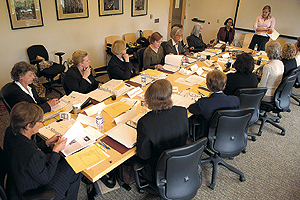- $47,900 for the Enrico Fermi Institute. The site of interdisciplinary research in the Physical Sciences and Mathematics, funding from the Women’s Board will be used to replace the electronic controls for an overhead crane and purchase a new overhead door in the Accelerator Building. These critical repairs ensure the safe assembly and timely transport of scientific equipment headed to experiments the world over, including the South Pole.
- $34,179 for the Analysis Research and Training Laboratories. These facilities, created for new Anthropology faculty member Robin Shoaps, will enable researchers to analyze sound and video recordings of human interaction, an area that has fueled recent theoretic advances in both linguistics and linguistic anthropology.
- $20,860 for the Creation of a Web-Based Ancient Greek Grammar. Helma Dik, Assistant Professor in Classics, is constructing a Web site that will enable students and scholars to access multiple levels of grammatical information with a few clicks of a mouse.
- $75,000 for the Smart Museum of Art. The Women’s Board is the primary sponsor of the 2007 exhibition Cosmophilia: Islamic Art from the David Collection, Copenhagen. This exhibition is traveling to only two cities in the United States, and will be a major component of the yearlong Silk Road Celebration, organized by Yo Yo Ma, the City of Chicago, the Chicago Symphony Orchestra and the Art Institute of Chicago. The exhibition will be accompanied by a full range of collaborative programs developed in coordination with the University’s faculty for school children, as well as the community at large.
- $21,404 for the Oriental Institute. The University and the Syrian Department of Antiquities are jointly excavating a large site in Hamoukar, Syria. Currently the only United States institution permitted to dig in Syria, the Oriental Institute will use these funds to conduct a Magnetometric Survey of the site, thus enabling the institute to apply for further funding to support future excavations.
- $42,037 for the Family Resource Center. This new center will serve as a key resource in promoting a healthy work/life balance for the 500 to 600 University graduate students with children. Families will have group play space with books and toys, and mothers will have a quiet room to breastfeed their children.
- $17,595 for the Department of Music. A concert grand harp will be purchased for student use. Only a few of the seven student harpists active in the department’s performance program own their own instrument. The harp will be used in concerts at Mandel Hall, Rockefeller Memorial Chapel and Fulton Recital Hall.
- $16,000 for four Jeff Metcalfe Student Internships. An initiative created by John Boyer, Dean of the College, these internships are at nonprofit institutions or in government, and would not exist without funding to pay participants a small stipend. Prior fellows have served at the Lincoln Park Zoo, the Field Museum and the Frank Lloyd Wright Preservation Trust.
- $15,000 for three Human Rights Internships. These internships enable students to work for agencies in the United States and abroad. The program is designed to embody the Human Rights Program’s mission to create a human rights paradigm that emerges from the liberal arts, is applicable in the contemporary world and links theory and practice.
- $15,000 for Books for the University’s Charter Schools. The University’s Center for School Improvement operates three charter schools in the surrounding neighborhoods, and these schools require seed money to create classroom libraries.
- $20,000 for Educational Advancement through Academic Competition. This pilot program will run math and debate competitions in 10 local elementary schools. The program involves after-school practices, a monthly competition and an annual tournament. More than 50 University students will participate in the program, which is overseen by the Office of Special Programs and the University Community Service Center.
University Women’s Board shows support through annual giving to various programs
By Jennifer CarnigNews Office
 The University Women’s Board gathers to discuss the initiatives it will fund at the University. | |
The University Women’s Board has awarded $359,000 in grants for the upcoming school year, money that will be used to support faculty research, cultural institutions, community outreach and student life.
Established in 1960, the Women’s Board has supported numerous University projects through the years, though over the past six years there has been a marked increase in member support, allowing the group to offer a record number of grants for its 2006-07 fiscal year.
In past years, the board has supported everything from purchasing radio equipment for the student-run radio station and sound equipment for the University News Office, to a new concert grand piano in Mandel Hall and helping fund the University’s Pediatric Immunization Program, a door-to-door immunization initiative that worked with residents of the Robert Taylor Homes.
For the upcoming academic year, the Women’s Board has voted to fund a number of initiatives. They are:
Other initiatives the board has voted to fund include $10,000 for Internships at Court Theatre; $11,280 for Chicago Careers in Business, a pilot project sponsored by Career Advising and Planning Services that pairs undergraduates interested in pursuing M.B.A.s with mentors in the Graduate School of Business; $9,000 for the Humanities Digital Media Archives; and $3,745 for the Committee on Evolutionary Biology to purchase four sets of two-way radios with Global Positioning Systems.
![[Chronicle]](/images/sidebar_header_oct06.gif)